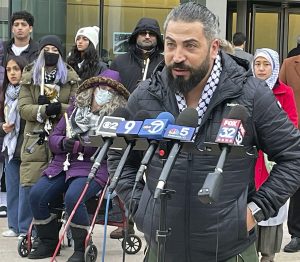A new White House strategy for combating anti-Muslim and anti-Arab hatred has received differing reactions from U.S. faith groups and left some wondering if the plan will survive the incoming Trump administration.
Released Dec. 12, the 67-page blueprint outlines federal, state and local approaches to addressing the surge in prejudice, bullying and violence U.S. Muslims have faced since the Oct. 7, 2023, Hamas terror attacks against Israel. The level of intimidation, the document said, mirrors that seen after 9-11.
“This hate includes violent attacks on children and students, bullying of children in school, and workplace discrimination. Arab American leaders and others have noted a strong correlation between these incidents and public rhetoric implying that Arab Americans, and Palestinians in particular, support or sympathize with terrorists,” the report says.
Interfaith Alliance welcomed the plan as “deeply necessary” for sending the message that discrimination against religious minorities and other vulnerable communities should not be tolerated.
“Interfaith Alliance is proud to represent the millions of Americans of diverse faiths and beliefs who are committed to standing firmly and proudly alongside their Muslim-American and Arab-American friends and neighbors to reject this bigotry — and to build powerful bridges of solidarity against it,” President Paul Raushenbush said.
But he also expressed uncertainty about the viability of the strategy after Trump takes office next month: “As we approach the presidential transition, we can only hope, and will continue to insist, that the incoming administration upholds the vital commitments made by the Biden administration. No matter what, we will do everything in our power to ensure that Muslim Americans and Arab Americans feel safe, welcome and equal across our country. That is what upholding true religious freedom looks like.”
The Council on American-Islamic Relations dismissed the plan as hypocritical due to Biden’s support for Israel’s war in Gaza and for his failure to spike a federal “watch list” that identifies some Arab Americans as possible terrorists.
If the president “truly cared about the safety of Muslims or reducing the threat of Islamophobia, he would make major changes to federal programs that perpetuate anti-Muslim discrimination, like the federal watchlist, and immediately stop enabling the biggest driver of Islamophobia: the U.S.-enabled Israeli genocide in Gaza,” the group said.
CAIR rejected the plan as “too little, too late” given the anti-Muslim track record of the incoming president. “While the White House’s new multi-agency national strategy to combat anti-Muslim bigotry would normally be a welcome step, its release just before the end of Biden’s term renders its future uncertain and it falls short of addressing the U.S. government’s own role in perpetuating Islamophobia both domestically and abroad.”
CAIR rejected the plan as “too little, too late” given the anti-Muslim track record of the incoming president.
Biden, however, said many of the actions called for in the strategy already have been implemented. “And although we may not immediately achieve all the change we seek, this strategy is a critical step in identifying the challenges we face and identifying solutions that civil society and state, local and national governments can implement over time.”
The priorities set out in the plan include boosting awareness of Islamophobia, enhancing knowlege of Muslim and Arab heritage, improving the safety of Muslim communities, countering discrimination and bias, and accommodating Muslim religious practices. States, local governments, schools and political leaders are urged to work in their contexts to enhance the Muslim experience in America.
The strategy follows the president’s national plan for combating antisemitism released last year amid rising bigotry against American Jews. But the need for an anti-Islamophobia effort became painfully evident with the October 2023 stabbing death of 6-year-old Palestinian Muslim Wadee Alfayoumi in Chicago, Biden said.

Odai Alfayoumi, father of slain 6-year-old Wadee Alfayoumi, addresses reporters in front of Will County Courthouse, Wednesday, Jan. 3, 2024, in Joliet, Ill. (AP Photo/Claire Savage)
“The attacker also repeatedly stabbed and gravely wounded his mother, Hanan Shahin. Wadee’s parents came to the United States in search of what we all seek: a fair chance at pursuing the American dream. These heinous acts shattered an American family. And they spread a wave of horror and fear across our nation.”
The White House strategy is the first of its kind and also will help those who have been harassed or attacked after being perceived to be Muslims, including Sikhs and Arabs, the president said. “Individuals and institutions, including places of worship, have been targeted. College students have been shot or assaulted as they walked down streets. Children have been bullied at school, including by having their religious head coverings ripped off. Workers have been denied jobs or demoted due to their faith. This is wrong. It is unacceptable. And it must change.”
The National Council of Jewish Women lauded the White House’s anti-Islamophobic strategy: “The work of fighting hate and discrimination should not fall upon impacted communities. Just as the Jewish community is not responsible for fighting antisemitism ourselves, the Muslim and Arab American communities should not be responsible for fighting hate alone.”
The council also praised the administration for taking the same “whole-of-government” approach to combating antisemitism in the U.S. “We are stronger as a nation when we are able to honor, respect and support one another in all aspects of who we are, and we look forward to continuing our work united together with our partners to build a more inclusive, compassionate, and just society.”



